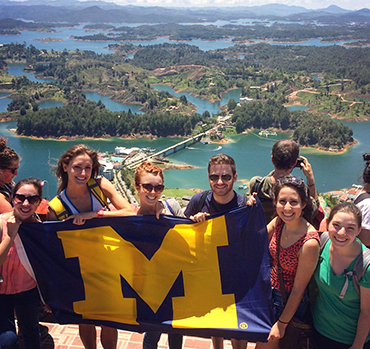The projects, led by Dr. John Piette in conjunction with colleagues at the University of Antioquia (U of A), involved adapting telephonic Interactive Voice Response (IVR) technology for tobacco and alcohol use intervention and prevention. Dr. Piette is a Professor of Health Behavior and Health Education at the School of Public Health, and also has an appointment in the medical school's Department of Internal Medicine. Five students made the trip, which was one of four Global REACH faculty-led international experiences offered in 2016.

“I’m still processing the experience and thinking about what role I want public health – and potentially international health – to play in my future career, but I would say that being a foreigner in a place where it’s not my first language was a growth experience,” said second-year medical student Hilary Iskin. “It helps you build empathy and I believe impacts the way you interact with patients, especially if they aren’t from the United States.”
The students spent most of June and July in Medellin, Colombia, working with Dr. Piette and his collaborators at the U of A and the school’s Living Lab, a kind of interdisciplinary academic incubator which brings scholars, students and nonprofits together to tackle various social challenges. Dr. Piette first partnered with Antioquia and Living Lab two years ago.
“I’ve been working with IVR in the United States and other countries for decades and it made sense to collaborate in Colombia, where they are really focused on diversifying the country’s economy and introducing more technology,” he said. “We’re fortunate that the University of Michigan supports partnerships and opportunities like this, which are wonderful for the students and also advance science even when it's not possible to get big research grants.”
One group of students spent much of the summer researching and making recommendations about how to build an IVR program aimed at curbing teen alcohol abuse. A second group, including second-year student Max Sokoloff, helped design a 10-week IVR smoking cessation program. Participants would receive automated weekly calls that glean information and, if needed or requested, connect them with specialists for one-on-one counseling. The students incorporated a text messaging component as well. They designed the framework and protocols for Living Lab to implement.
“It was a worthwhile experience, not only because it could benefit a lot of people, but also from a personal standpoint,” Sokoloff said. “For me, I can see myself working in some kind of teaching institution, because I really enjoyed working with all of the mentors at Living Lab.”
Indeed, among the chief takeaways for students is that expertise, best practices and mentors can be found outside of their own institution – including outside the US, said Dr. Piette, who has overseen student research projects across Central and South America.
“There’s this misconception that we’re going into these low- to middle-income countries and coming to the rescue. But the truth is that we’re working with some of the best physicians and researchers anywhere when we go to these places,” Dr. Piette said. “People all over the world have important things to teach and show us. That’s one lesson that students on these experiences take with them into their professional career.”
